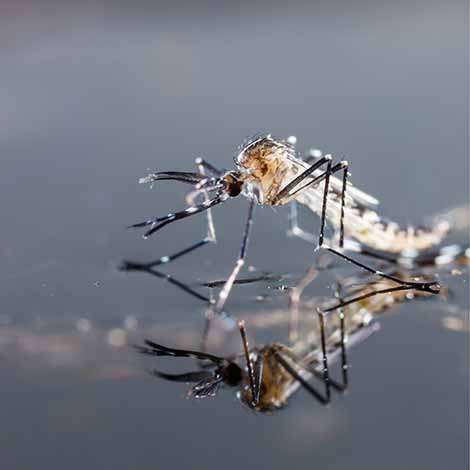Sitting outside to enjoy the weather and scenery is a great way to spend an evening at home, but we've all had a moment like that ruined by a swarm of pesky mosquitoes biting at our arms, neck, and legs. Besides causing itchy welts, they can also transmit dangerous diseases, like malaria, dengue, yellow fever, West Nile virus, dog heartworm, Zika virus, and equine encephalitis.
Citronella candles and bug spray can help keep them at bay, but the best pond mosquito control methods are those which treat the source directly. For example, you're more likely to find mosquito larvae in water if that water is stagnant, so implementing a system to keep water moving can help. And while it's not practical to dry up every rain puddle around your home, cleaning up and treating areas where water pools in your yard can greatly reduce the number of mosquitoes you deal with.
Keep reading to learn more about how mosquitoes multiply and, more importantly, how to kill mosquito larvae and adults through effective mosquito pond treatment.
Multiplying Mosquito Larvae in Ponds
Mosquitoes begin life as tiny eggs on the surface of fresh, stagnant water. One or two days after being laid, they hatch into larvae, a.k.a. "wigglers." The half-inch larvae live on the water surface for four to 14 days eating algae, plankton, fungi, bacteria, and other microorganisms that float by. As the wigglers develop, they molt four times before going into their pupa stage. Mosquito pupae, commonly called "tumblers," live in the water for one to four days before emerging as full-grown adults.
How to Keep Mosquitoes Out of a Pond
As we mentioned above, the best pond mosquito control methods attack the source. This means preventing the females from laying eggs in the first place. Here's what we recommend:
- Remove the Habitat: Because mosquitoes prefer to lay eggs in stagnant water, cut down and remove dead debris around the edge of the pond with Weed Cutters and Rakes. Also, drain containers with standing water (buckets, gutters, and ditches) and regularly change the water in animal troughs, pet dishes, and birdbaths.
- Keep the Water Moving: In your pond or lake, add an Airmax Aeration system or Pond fountain to improve oxidation and eliminate stagnant water. Females won't want to lay eggs in agitating water, so this preventive measure can tremendously cut down on mosquito population.
- How to Kill Mosquitoes in Water: If these natural methods aren't effective enough, use Mosquito Dunks or Mosquito Bits work great as a temporary mosquito killer for ponds. These mosquito destroyers contain Bt-israelensis (Bt-i), a specially formulated biological pesticide just for mosquitoes. They're safe for use around fish and plants, and they provide relief for up to 30 days.
- Mosquito Eating Fish: If you don't already have a fish population living in your lake, consider adding some mosquito fish that eat mosquito larvae and fish that eat mosquitoes that are grown. Mosquito eating fish are small in size and they love to gobble the wigglers and tumblers. The American Mosquito Control Organization recommends adding predacious minnows or native fish to lakes and ponds for biological control of the insects.
Remember that an effective mosquito control strategy includes preventing eggs from being laid, killing mosquito larvae in water, and driving away grown mosquitoes with mosquito eating fish. A single product or method won't tackle all three areas, so it's important to implement a balanced combination of physical control, aeration, biological control, and even chemical control. This will ensure the best results and help you go back to enjoying your pond or outdoor space in peace.
Next Steps
That concludes our best practices for pond mosquito control, but don't hesitate to reach out to our customer service team if you have any other questions. For help with larger-scale efforts, you can also contact a state, county, or city mosquito control organizations. Learn more about the American Mosquito Control Association at www.mosquito.org.
Sources
- Centers for Disease Control and Prevention. "Mosquitoes" https://www.cdc.gov/. 3 February 2021.
Last Updated: October 23, 2023
